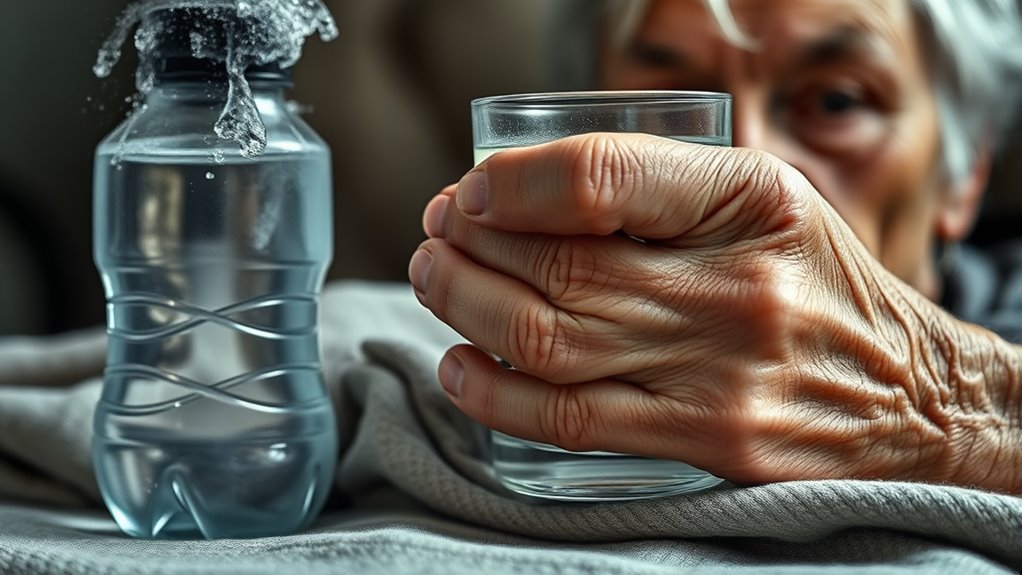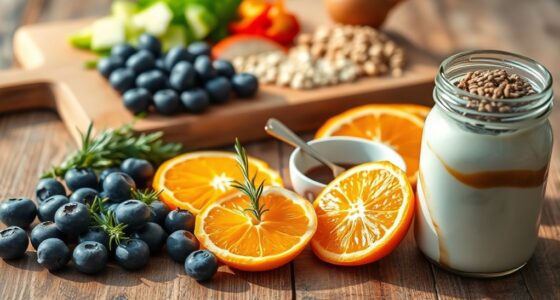As you age, staying hydrated becomes tougher because your body signals to thirst weaken, and kidney function changes make electrolyte balance harder to maintain. You might not notice dehydration symptoms like dry mouth or dizziness until it’s serious. Using strategies like drinking small amounts regularly, incorporating electrolyte-rich foods, and tracking your intake can help. Keep exploring to discover more ways to stay properly hydrated and avoid health issues related to dehydration.
Key Takeaways
- Aging reduces thirst sensation and kidney function, increasing dehydration risk without obvious symptoms.
- Older adults often experience electrolyte imbalances that impair fluid retention and muscle or nerve function.
- Diminished thirst awareness leads to inadequate fluid intake, requiring routine hydration strategies.
- Medications and health conditions can further disrupt electrolyte balance, complicating hydration efforts.
- Regular monitoring of hydration signs and incorporating electrolyte-rich foods/supports helps prevent dehydration.

As you age, staying properly hydrated becomes increasingly challenging due to various physiological and lifestyle factors. Your body’s ability to recognize thirst diminishes, making it easy to become dehydrated without realizing it. Additionally, age-related changes in kidney function can affect electrolyte balance, which is essential for maintaining proper hydration and nerve function. If your electrolyte levels become imbalanced, you might experience fatigue, dizziness, or muscle cramps, all signs that your hydration needs aren’t being met. To combat this, adopting effective fluid intake strategies becomes indispensable. These strategies involve not just drinking enough water but also managing electrolytes through balanced consumption of beverages and foods.
One key aspect of maintaining hydration is understanding your fluid intake strategies. It’s not enough to sip water sporadically; you need a consistent approach that aligns with your daily activities and health status. For example, drinking small amounts frequently throughout the day helps your body absorb fluids more effectively than consuming large quantities at once. This approach also reduces the risk of overburdening your kidneys or causing discomfort. Incorporating fluids into your routine—such as having a glass of water with each meal or keeping a water bottle nearby—can serve as helpful reminders to stay hydrated. Moreover, understanding the importance of hydration-related factors can help optimize your fluid management strategy.
Electrolyte balance plays a fundamental role in this process. Electrolytes like sodium, potassium, and magnesium help your body retain fluids and support nerve and muscle function. As you age, you may find it harder to maintain this balance, especially if you’re on medications that influence electrolyte levels or have certain health conditions like heart or kidney disease. To support electrolyte health, consider including foods rich in these minerals—such as bananas, nuts, and leafy greens—in your diet. Sometimes, electrolyte-enhanced drinks can be beneficial, especially during hot weather or after physical activity, but it’s best to choose options with low added sugar and consult your healthcare provider first.
Monitoring your hydration status is equally important. Pay attention to signs like dark urine, dry mouth, or feeling unusually tired, which can indicate dehydration. Establishing a daily routine for fluid intake and being mindful of your electrolyte needs can considerably improve your hydration status. Remember, staying well-hydrated isn’t just about drinking water; it’s about maintaining a proper electrolyte balance and adopting fluid intake strategies tailored to your lifestyle. This proactive approach can help you avoid the health complications associated with dehydration and ensure you stay energized and healthy as you age.
Frequently Asked Questions
How Does Medication Affect Hydration in Older Adults?
Medications can substantially impact your hydration by causing interactions that disrupt your electrolyte balance. Diuretics, for example, increase fluid loss, risking dehydration, while certain medications might make you less aware of thirst cues. You need to stay vigilant, monitor your fluid intake, and discuss any medication side effects with your healthcare provider to guarantee your electrolyte levels remain balanced and you stay properly hydrated.
What Are Signs of Dehydration in Seniors?
You might notice signs of dehydration in seniors, such as increased thirst sensation, dry mouth, and darker urine. They may also experience dizziness, fatigue, or confusion. Dehydration can disrupt electrolyte balance, leading to muscle cramps or irregular heartbeat. Keep an eye on these symptoms, especially if seniors are less responsive to thirst cues, and encourage regular fluid intake to prevent complications.
Can Hydration Improve Cognitive Function in Older Adults?
Did you know that proper hydration can boost cognitive function in older adults? When you stay well-hydrated, you help maintain electrolyte balance and brain hydration, which are essential for peak brain activity. Improved hydration supports memory, focus, and mental clarity. So, drinking enough water isn’t just about physical health—it’s a key factor in keeping your mind sharp and functioning well as you age.
Are There Specific Fluids Recommended for Elderly Hydration?
You should consider electrolyte solutions and herbal teas for elderly hydration. Electrolyte solutions help replenish essential minerals lost through sweating or illness, supporting balanced hydration. Herbal teas are a flavorful, soothing option that encourages fluid intake without added sugars or caffeine. Both options can be advantageous, but always check with a healthcare professional to ensure they suit your specific health needs and avoid any potential interactions.
How Can Caregivers Encourage Hydration in Seniors With Dementia?
You can encourage hydration in seniors with dementia by using flavor strategies like adding natural fruit or herbs to drinks, making them more appealing. Offer hydration aids such as ice chips, popsicles, or flavored water to boost intake. Gently remind them to drink regularly, create a routine, and provide small amounts often. Staying patient and consistent helps make hydration easier and more enjoyable for your loved one.
Conclusion
As you navigate the hydration challenges faced by older adults, remember that staying well-hydrated is essential for maintaining health and vitality. Don’t let the modern hustle distract you from this timeless truth—like a well-placed quill, proper hydration remains important. By being attentive to signs of dehydration and encouraging good habits, you guarantee that your loved ones age gracefully and comfortably, proving that some wisdom, much like a vintage fountain pen, never goes out of style.









